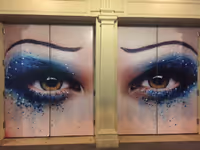Will filming Broadway shows ever be profitable?
#1Will filming Broadway shows ever be profitable?
Posted: 9/2/18 at 4:49pm
An honest question--
I spent nearly an hour on FilmedonStage.com reading a couple of articles on the short-lived 'Broadway Television Network' that attempted to film Broadway musicals in the early 2000's only to fail after 3 shows. They spent 4 years working on contracts with all the unions but couldn't really take off with the money generated from PPV. It's interesting how this company was such ahead of its time, anybody remembers how they tried streaming musicals back when people were using dial-up connections?
So you can't really help but notice how BroadwayHD is basically the same company set in 2018. While they already got to film more than 3 shows (She Loves Me, Holiday Inn, Falsettos, Toxic Avenger,...) I really don't see how they can become a profitable business with the unions STILL being an obstacle in the way of everyone. I know they worked on contracts with all of them - but so did the Broadway Television Network 20 years ago.
Filming in the West End is a totally different story - An American in Paris in the UK cost $950,000 while the budget for filming a Broadway show like Memphis was estimated at around $3,000,000. The highest grossing filmed musical grossed around $2,500,000 in the box office (Newsies).
So why is Broadway still stuck in the 20th century in terms of distribution channels?
Impossible2
Broadway Legend Joined: 3/31/18
#2Will filming Broadway shows ever be profitable?
Posted: 9/2/18 at 4:51pm
Those budgets are ridiculous, there's no way it costs that much x
#3Will filming Broadway shows ever be profitable?
Posted: 9/2/18 at 4:59pm
This NYT article mentions Memphis grossed $2-2.5M in the box office and still failed to recoup the investment for the filming:
https://www.nytimes.com/2014/10/07/theater/of-mice-and-men-from-broadway-to-movie-screens.html
I believe there was another article that mentioned the $3M price tag
billyelliotfan123
Leading Actor Joined: 10/24/09
#4Will filming Broadway shows ever be profitable?
Posted: 9/2/18 at 5:01pmAs someone who used to create some of these budgets it is unfortunately mind blowing how the expenses add up. You needed to pay everyone multiple weeks of their salary. We even had to pay hundreds of thousands to the theater owners. You also need to pay the writers, directors, designers, and stagehands. Acquiring the rights to film the show also can get expensive depending on the title. Equipment rentals are also very expensive. The trucks you see parked outside must be rented for multiple days and that is not cheap. Then on top of that the film crew is also in a union. All of this adds up very quickly.
bk
Broadway Legend Joined: 7/20/03
#5Will filming Broadway shows ever be profitable?
Posted: 9/2/18 at 6:05pm
TaleofTwo said: "This NYT articlementions Memphis grossed $2-2.5M in the box office and still failed to recoup the investment for the filming:
https://www.nytimes.com/2014/10/07/theater/of-mice-and-men-from-broadway-to-movie-screens.html
I believe there was another article that mentioned the $3M price tag"
a) it didn't gross that - the spread should tell you that they were not given accurate figures.
b) even if it had, that's what it took in. the production company gets only a percentage of the total. I should think they didn't even make one million after advertising costs - in fact, I would not be surprised if they made much of anything back.
#6Will filming Broadway shows ever be profitable?
Posted: 9/2/18 at 6:24pmI wonder if it was cheaper at all for Newsies to film outside of New York. Maybe we can see an uptick of touring productions being filmed than the broadway production.
#7Will filming Broadway shows ever be profitable?
Posted: 9/2/18 at 6:50pm
I think it just depends on the Broadway show and whether there's a nationwide market for it. For instance, we all know the original Bway cast of HAmilton was filmed back in 2016. When they edit and release it in theaters nationwide, I can easily see it being profitable.
If they made a professional film of Dear Evan Hansen with Ben Platt still in it, I think that would have been profitable too once shown in cinemas nationwide.
Other shows, however, would have a hard time and similar to what others have said, it costs too much $$$ to justify it (presuming the likelihood of recouping the cost is low.)
#8Will filming Broadway shows ever be profitable?
Posted: 9/2/18 at 6:59pm
Wick3 said: "I think it just depends on the Broadway show and whether there's a nationwide market for it. For instance, we all know the original Bway cast of HAmilton was filmed back in 2016. When they edit and release it in theaters nationwide, I can easily see it being profitable.
If they made a professional film of Dear Evan Hansen with Ben Platt still in it, I think that would have been profitable too once shown in cinemas nationwide.
Other shows, however, would have a hard time and similar to what others have said, it costs too much $$$ to justify it (presuming the likelihood of recouping the cost is low.)"
That's true, and yet it is mostly producers of flops/moderate hits/limited runs that take the risk and film their shows. Can't think of many big hits that were filmed for distribution.
#9Will filming Broadway shows ever be profitable?
Posted: 9/2/18 at 7:02pm
Call_me_jorge said: "I wonder if it was cheaper at all for Newsies to film outside of New York. Maybe we can see an uptick of touring productions being filmed than the broadway production."
It might not be as cheap as filming in London, but i'm sure it is somewhat cheaper than filming on Broadway. I don't think Disney needed the discount though, they just didn't want to release anything before all productions close.
#10Will filming Broadway shows ever be profitable?
Posted: 9/2/18 at 7:22pm
TaleofTwo said: "Wick3 said: "I think it just depends on the Broadway show and whether there's a nationwide market for it. For instance, we all know the original Bway cast of HAmilton was filmed back in 2016. When they edit and release it in theaters nationwide, I can easily see it being profitable.
If they made a professional film of Dear Evan Hansen with Ben Platt still in it, I think that would have been profitable too once shown in cinemas nationwide.
Other shows, however, would have a hard time and similar to what others have said, it costs too much $$$ to justify it (presuming the likelihood of recouping the cost is low.)"
That's true, and yetit is mostly producers of flops/moderate hits/limited runs that take the risk and film their shows. Can't think of many big hits that were filmed for distribution."
The reason you only really see limited runs or closing shows recorded is because the producers know they're not going to continue to make ticket revenue and can therefore justify the cost of filming the show so that they can continue to profit after it closes. You won't see many currently-running hits get a professional recording because they're still raking in ticket money week after week. It doesn't make financial sense for a show to front the cost of a recording if they have no fear of closing and ceasing to make money. Take the professional recording of Shrek, for example. It was recorded fairly early in the show's run, when the original cast was still performing, but wasn't released to the public until well after the national tour had closed a few years later. Once the show is no longer profitable onstage, it makes sense to put out a recording so that the show can continue to make money. There are a few exceptions to this, such as Memphis, but the majority of professionally shot Broadway musicals that are available (She Loves Me, Bandstand, Newsies, Falsettos, RENT, etc) were shot near the end of their run with the knowledge that they would be closing soon. We probably won't see Hamilton released for a long time- there may be high demand to see the original cast amongst die-hard fans, but with six productions currently running and a seventh set to open in Puerto Rico, people are clearly still interested in buying tickets, which is ultimately more profitable.
#11Will filming Broadway shows ever be profitable?
Posted: 9/2/18 at 11:13pm
The Broadway business model is broken and must be fixed. The other entertainment media has gone through wrenching changes and have more yet to experience. But they are making the needed changes.
Music is increasingly not listened to on your FM stereo radio or receiver and purchased by taking possession of a tangible disc. The music is instead streamed to you through the atmosphere as a series of 0's and 1's. Since the recording artists can no longer collect compensation for their work by receiving a cut of the sales of CDs, the music industry is gradually adapting to a new model where the artists are paid by the broadcasters each time they stream one of an artist's songs to someone.
Television has of course almost buried its 65 year old distribution process that originally limited viewers to a small selection of programs run on schedule by a handful of television broadcasters. Increasingly you choose what you want to view out of a much wider selection and when you want to view it. Films follow nearly the same path after the end of their first run in theaters.
About two thirds of Broadway tickets, I read, are purchased by domestic and foreign tourists. If so many high income tourists are willing to spend a small fortune for a long weekend in the city to see shows under hostile "no refund, no exchange" policies, how many are there out there that would pay $50 bucks to see a filmed edition of a show? I saw Bandstand several times in the Broadway theater, and when I saw it one last time in the cinema I did not feel let down. Embarrassing tears started welling up in my eyes at the same points.
But the shows must be on-demand to home entertainment systems. Don't make someone have to get out and go to the movies. The audio and video of home systems has improved so much. Remember, if you see the play in the Broadway theater you are still hearing the voice of the performers through the filter of electric amplification.
The plays and musicals are not the only asset that can be sold. Broadway possesses an enormous amount of talent not being given the showcase it deserves. Remember when PBS used to run shows for Broadway afficianandos like the My Favorite Broadway series hosted by Julie Andrews or even the weekly Boston Pops shows that frequently highlighted Broadway talent or was built around a theme of a particular composer? Cabaret? Give Stephanie and Megan and Laura and Jessie something to do in between shows.
Of course the audience for these shows would be a small percentage of the total population. But since the total population is huge, a small percentage of a huge number is a very large number. And the demographics for people who would watch these shows are upper education and income.
Sorry. Using so much space and still just touch on the issues involved. But something must be and can be done. Right now the audiences are losers with the expensive ticket prices, The performers are losers when they must get through eight shows a week including two doubleheaders. (Did you read the interview with Idina Menzel a month ago about the difference between doing a musical and a straight play? With the play her first task on waking up was not to do a voice check on herself to see how hard the day would be.) The entire theater community loses when stars like Audra McDonald and Kristin Chenoweth just can't manage the eight shows without making great sacrifices.
Even the investors might gain by becoming real investors with a chance to make a profit, instead of donors who are allowed to receive one lottery ticket giving them the chance of something big.
#12Will filming Broadway shows ever be profitable?
Posted: 9/2/18 at 11:25pm
TaleofTwo said: "So you can't really help but notice howBroadwayHDis basically the same company set in 2018. While they already got to film more than 3 shows (She Loves Me, Holiday Inn,Falsettos, Toxic Avenger,...) Ireally don't see how they canbecome a profitable business with the unions STILL being an obstacle in the way of everyone."
Has BroadwayHD filmed any shows? Those all seem like shows that were recorded by others and then BroadwayHD just paid for streaming rights.
#13Will filming Broadway shows ever be profitable?
Posted: 9/3/18 at 1:18am
@OlBlueEyes, you are just repeating the same ol' "Broadway is Dying" claptrap we have been listening to since the beginning of Broadway. It ain't broke and it certainly doesn't need the kind of fix you are proposing. The only thing that will kill Broadway is if the powers that be sacrifice what makes it unique-that it is live and that the experience takes place every night between one cast and one audience. Commoditizing the theatre strips it of the one thing that makes people willing to pay dearly to see it. Films do films better than theatre does (just as theatre does theatre better than film does). When you put theatre on film, you sell the art form to the lords of mediocrity. Luckily, the stewards of the theatre are largely aware of this and have not succumb to the temptation to turn the theatre into a commodity. Oh and by the way, singers and bands don't make a living from streaming revenue and (except in extremely rare cases) never will. Know how they make money? Traveling around the world performing live (and selling some merch along the way).
#14Will filming Broadway shows ever be profitable?
Posted: 9/3/18 at 7:53am
haterobics said: "TaleofTwo said: "So you can't really help but notice howBroadwayHDis basically the same company set in 2018. While they already got to film more than 3 shows (She Loves Me, Holiday Inn,Falsettos, Toxic Avenger,...) Ireally don't see how they canbecome a profitable business with the unions STILL being an obstacle in the way of everyone."
Has BroadwayHD filmed any shows? Those all seem like shows that were recorded by others and then BroadwayHDjust paid for streaming rights."
BroadwayHD produced with their own money shows like: She Loves Me, Old Hats, Holiday Inn, Ernest Shackleton Loves Me, The Wind in the Willows, The Toxic Avenger, Ann, Bright Colors Bold Patterns, The Portuguese Kid, Indecent, Present Laughter, and some more off-broadway plays...
#15Will filming Broadway shows ever be profitable?
Posted: 9/3/18 at 5:10pm
TaleofTwo said: "BroadwayHD produced with their own money shows like: She Loves Me, Old Hats, Holiday Inn, Ernest Shackleton Loves Me, The Wind in the Willows, The Toxic Avenger, Ann, Bright Colors Bold Patterns, The Portuguese Kid, Indecent, Present Laughter, and some more off-broadway plays..."
She Loves Me, Holiday Inn, Indecent and Present Laughter were all originally PBS productions, no?
#16Will filming Broadway shows ever be profitable?
Posted: 9/3/18 at 5:28pm
She Loves Me and Holiday Inn were originally streamed live on BroadwayHD. She Loves Me is a Guinness World Record holder for the first Broadway show in history to be live streamed.
#17Will filming Broadway shows ever be profitable?
Posted: 9/3/18 at 8:23pm
haterobics said:
She Loves Me, Holiday Inn, Indecent and Present Laughter were all originally PBS productions, no?"
BroadwayHD produced all of the Great Performances shows on PBS, PBS helped fund them in exchange for airing them before they streamed on BroadwayHD.
#18Will filming Broadway shows ever be profitable?
Posted: 9/3/18 at 8:27pm
HogansHero said: "@OlBlueEyes, you are just repeating the same ol' "Broadway is Dying" claptrap we have been listening to since the beginning of Broadway. It ain't broke and it certainly doesn't need the kind of fix you are proposing. The only thing that will kill Broadway is if the powers that be sacrifice what makes it unique-that it is live and that the experience takes place every night between one cast and one audience. Oh and by the way, singers and bands don't make a living from streaming revenue and (except in extremely rare cases) never will. Know how they make money? Traveling around the world performing live (and selling some merch along the way)."
Hogan, if you believe that Broadway is healthy these days then you have had your head under the ground for as long as your namesake. Most with even a limited knowledge of business would see trouble when four of five shows lose the money of their donors. That is what they are. Donors, not investors.
No one is going to disrupt theater. The same live shows will be presented to all those mostly tourists with the great demographics of income and education. But a huge audience around the country will be able to come up with $20 to $40 dollars (I know not the exact amount) that will enable them to experience Wicked or The Bands's Visit. from their own home and their own family entertainment system. The sound produced by the home speakers may well be better than the sound in many locations of many theaters.
The theater is also failing to monopolize on a major source of revenue in a capitalist country: advertising. The Jaguars let Lucas Oil lend its name to its new stadium and much of the cost of its construction is covered. Tradition-bound Saratoga Race Course lets a new sire to be, RunHappy, lend his name to the premier race, The Travers, and there's enough money to pay its $1.5 million purse.
The theater, with its high demographics of income and occupation, would attract many sponsors who wanted to be connected with the New York music world. I'm sure that you have heard of the word "monetize." It's what Facebook did not due with Instagram until just recently. Turn a popular site for people with similar interests into a source of revenue.
Please don't try to instruct me on the subject of touring. As a former adviser to Live Nation let me tell you that the explosion in touring is a direct result of the disappearance of CDs and other tangible items on which the musicians' music could be sold. The music industry has been through a lot, but the transition from paying recording artists with a part of the money generated by CD sales is getting close to the end. Transitioning to the artists being paid copyright fees from the broadcasters who play their music is slowly taking over.
Touring has been an interim fix. Not that very old friends like Jorma and Cassady don't still enjoy playing together now in their seventies, but running around the country playing one night stands is difficult for those over seventy.
If you are really interested in learning about the changes in the music industry, which relate greatly to changes which must be made in theater, I can look for a couple of links. But I really believe that you are not interested in sharing information with someone. You are just looking for someone to bully.
Rainah
Broadway Star Joined: 11/24/16
#19Will filming Broadway shows ever be profitable?
Posted: 9/3/18 at 9:47pm
I think it can be profitable, but not until it becomes much more expected/mainstream. When film rights are written into everyone's contracts as a matter of course, rather than negotiated afterwards with every single person. When seeing a broadway show in a movie theatre (or streamed at home) is a generally accepted practice for non-diehards, and they get wider releases.
There's a huge economics of scale at work, and right now it's working against them.
#20Will filming Broadway shows ever be profitable?
Posted: 9/3/18 at 10:23pm
@OlBlueEyes
re Broadway economics, it has always been thus; it's the nature of the beast. It's not something new.
re selling recorded/streamed/etc Broadway, we don't agree. I think it is the single most dangerous peril facing this business. It is throwing away what is unique and selling a mediocre substitute.
re the music industry, no thanks, but I will say that a lot of this is about putting the genie back in the bottle, which is not gonna happen. copyright is a 20th Century abomination that's due for its 21st Century remake. Value is in delivery, not content. It's a bitter pill.
And ya know, bullying is a serious thing and you diminish it in an offensive way when you use the term to mean that someone disagreed with you or called you on something.
#21Will filming Broadway shows ever be profitable?
Posted: 9/3/18 at 11:27pm
@OlBlueEyes, the theatre is certainly behind professional sports, but there is plenty of advertising: Playbills are provided to the show for free because they make money by selling ads. Theaters can pay for renovations by selling naming rights (the American Airlines didn't get that name because Roundabout wanted to honor their favorite airline) and opening night parties, green rooms and star dressing rooms are often sponsored (look in the back of the Playbills, even washing machines, props and costumes are often sponsored.) And if you don't think Broadway is healthy, how do you explain the box office and attendance records that keep getting broken each season?
#22Will filming Broadway shows ever be profitable?
Posted: 9/4/18 at 6:12am
Hogan, you are I'm sure aware of your own "lack of graciousness" in addressing people with whom you disagree. I don't think that by my labeling you a bully you really have to worry about people confusing you with a school child who intimidates other children. But I retract the word. You are not a bully towards others here on the board. Maybe you would like to attach your own label to yourself.
Since we agree on nothing, I'll just state why I'm upset about the current state of musical theater. Attendance and box office keeps setting records. Yet almost all investors lose money. How kind of them. Why did Roundabout go from a fabulous season of Cabaret and On the 20th Century to a quiet season of She Loves Me, to which they sold the recording rights, to budget Holiday Inn, to nothing. Money?
Exactly who are the lucky few who get to see the live show? Quoting from the 2017 Broadway League report, 61 percent are tourists, the average age of one attending is 41.7 years and the average household income of the theatergoer is $194,940.
So this is what Broadway exists for. To entertain a small number of the elite? While Kelli O'Hara is growing up in rural Oklahoma and watching the film version of Oklahoma on TV. Do you think that the elegant live broadcast of South Pacific in 2010 would have even taken a bite out of her desire to see the show live. I sure don't. How many of us here near Manhattan see a show we like multiple times. And we're seeing the live production.
But what really, really concerns me about the state of the theater is that, due to the great risk of investing in a Broadway musical, producers and directors are trying to minimize the risk by drawing on known hits of the pop culture to build musicals around.
I really hope that it was just a put-on last week when a thread was started on a new musical based on Green Acres. Look at all the pop films and other forms of entertainment that have been the source of musicals lately. Pretty Woman. Spiderman. This is a challenge to Oscar the Great's re-creation of the musical as truly a musical play derived from an existing piece of literature or conjured up in the head of the book writer. The literature supplying the inspiration did not have to be great in itself. Show Boat and Green Grow the Lilacs are not classics in themselves, but a talented professional writer set the scene, created the characters and defined the conflicts. Famous writers, John Steinbeck in particular, wrote new novels to see them produced on Broadway. It was prestige.
Now I see the musical theater, which used to be a beacon leading us away from the pop culture, is now becoming just another outlet for all the trash.
#23Will filming Broadway shows ever be profitable?
Posted: 9/4/18 at 7:03am
I think that "creating a brand" is profitable, and shows are brands.
The filming of Miss Saigon in London was a very smart move, it is the ultimate promotion and it is slowly expanding the brand worldwide.
They have done this with Les Mis and Phantom before, (concert version or the actual show such as Phantom in Royal albert hall) and these have expanded the brand and boosted ticked sales for the actual shows. It's recognition for audiences. Which ultimately makes people excited for a filmed Hollywood version too.
I think the reason many great shows are not profitable is because they are too obscure.
ScottyDoesn'tKnow2
Broadway Legend Joined: 1/22/14
#24Will filming Broadway shows ever be profitable?
Posted: 9/4/18 at 11:04am
I'm spoiled now that I live in New York, but when I did not, I would have killed to see many filmed shows. Heck, considering how expensive tickets can be, I would still pay to watch filmed performances if they are cheaper than seeing certain shows live. The problem is that I doubt I'm in the majority. There needs to be a viable demand to make these taped/filmed/digitally captured performances profitable. So first, we need to make Broadway music hit the mainstream. That's a problem I have no answer to but I bet someone much smarter can figure something out. I also think it can be done well as I do think there is a craft and art to adapting filmed stage performances and there are people out there who would do it well.
Updated On: 9/4/18 at 11:04 AM#25Will filming Broadway shows ever be profitable?
Posted: 9/4/18 at 11:24am
@OlBlueEyes
Thank you for the retraction. I don't think it is inconsequential because when we dilute words, that has an effect. I think you mistake robust debate for ungraciousness but I won't argue the point.
I understand your point of view (which many others share); I just don't agree with it, but I understand the point of view. Let's not confound things by discussing what a non-profit does, but in general Broadway is a commercial enterprise and should be viewed as such. In several respects, you treat things today as different, but in many respects it was always this way.
1. Most shows have always lost money. (People invest not out of charity but because they want to make money. The risk is high but limited to one's investment. The upside is unlimited. Think of Broadway as investing in oil drilling.
2. There has always been a lot of crap, some of it successful and some not.
3. Your vision of "leading us away" is dead wrong, both historically and presently. It is also deadly. Musical theatre WAS popular culture until it took a wrong turn. It's headed back, and not because of the crap, most of which, incidentally, fails miserably. The highlights of the last few seasons have evinced the prestige you seem oblivious to.
All of this, of course, is a side bar to the question presented in this thread. I doubt you will convince me that the health of Broadway is to be found in sacrificing its uniqueness but you won't be the first to try.
Videos










